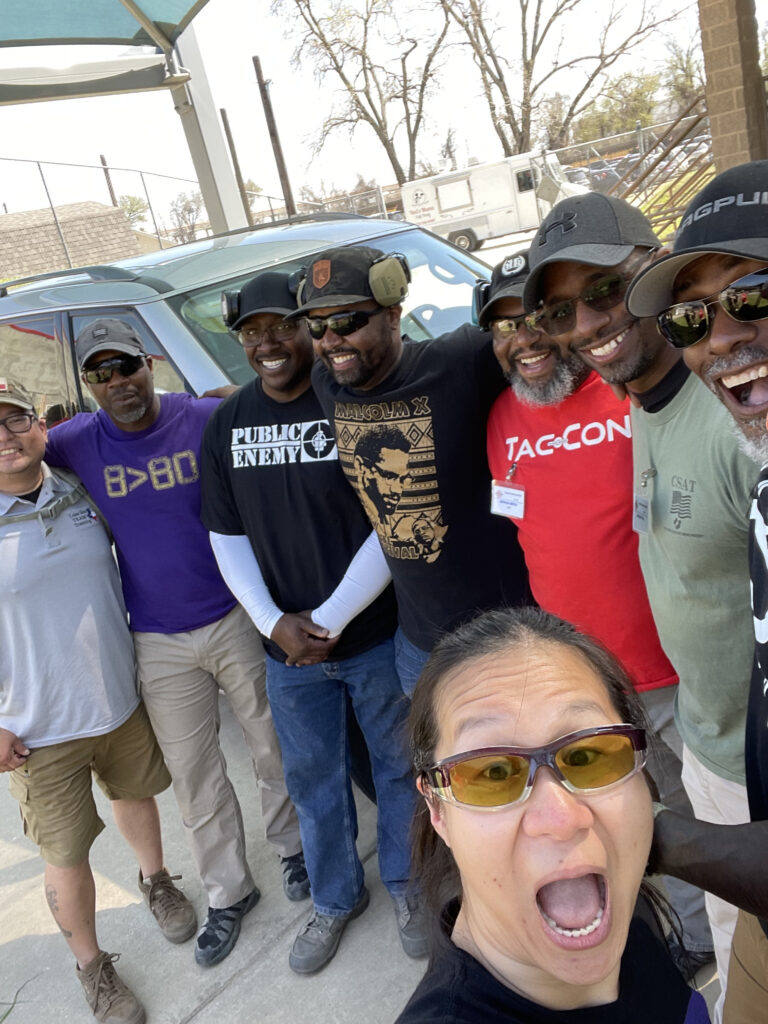
One of the really neat things about walking around Tac-Con this year was seeing the increase in diversity. It’s not that I’ve ever felt unwelcome in that crowd; quite the contrary, really. Showing up, participating, and trying were all that were required to be included – enthusiastically and with genuine camaraderie, even brotherhood and sisterhood. There’s something a little special, though, when you meet another person who is like you in some way, whether it’s same gender, same race, same disability, same oddball hair color, same profession, same family background, same geographic origin, or simply both being different from everyone else. We get a little awkward recognizing it sometimes, but I think it’s vitally important to acknowledge the instant connection, the flash of “yes, someone like me!” that makes us feel just a little bit more belonging, like we’re in the right place after all. Let me be clear: this isn’t about being left out in some way until and unless some other minority of some stripe shows up, but about finding extra enjoyment in something we might not get to experience anywhere at all, let alone in a specific environment.
It’s something I was thinking about at Tac-Con, but it comes up in other places too. I’ve had that moment in workplaces, in classes completely unrelated to shooting or fighting, occasionally in waiting rooms or other semi-public areas where I’m wondering if I should be there at all. There’s a catching of the eye, a nod, a frisson of recognition. A smile, perhaps, as we both enjoy the relief of not being the only ones who stand out or who don’t quite fit in in some way. It’s a little strange because so many of us are so very aware of how we stand out, and how difficult it can be to acknowledge this thing we’re somehow not really supposed to talk about, not the least because it could make the majority around us uncomfortable. Whether or not any of that is true, it can give us pause as we waver between appreciating having another person there who we have an immediate, if superficial, connection with, and feeling shy about putting voice to that feeling. I’ve taken to sometimes going up to these people and being up front about the potential offense as I give voice to it, so that we can perhaps enjoy getting that feeling out in the open, maybe laugh about it.
See, there’s power in having someone else who looks like you in a place you want to be. It may be that they are role models, showing you that they can succeed so that you can too. It may be that they are compatriots, struggling in ways that you are that somebody else might not truly be able to understand because they don’t have the same intrinsic life experience you share. It may be that they inspire you to be the best you can be, so that you can be the trailblazer, knowing there is someone to follow you. We’ve seen it famously in the business world, where women rising to managerial and executive roles create a domino effect and lead to more who fill those roles. Whether it’s because they are inspired by seeing women who look like them being promoted or because those doing the promotion realize that women can belong there, “looks like” has an immense effect on bringing in and encouraging continued effort to participate and excel. When we see someone who looks like us in a position, we can imagine ourselves there, and if we talk to them, we can learn from how they’ve faced the obstacles we share.
“Looks like” matters not just for the inspiration, but for the comfort level. It can get exhausting, always being the different one. There are so many unspoken details of our lives that could be communicated wordlessly if only we had someone who was part-mirror to us, that could be understood by someone who’s lived a life with similar features to ours. They might not be completely pertinent pieces of the task in front of us right now, but they come up nonetheless. Maybe they’re just a joke that isn’t nearly so obvious to someone without a shared cultural experience, or a struggle that specifically affects folks with characteristics unique to us. It’s not that others can’t understand or can’t have empathy, but that it can be nice to not have to explain. When we’re somewhere that’s already a little bit of a stretch for us, a little outside our norm, it can be nice to have a small representation of home, a small reflection of who we are in somebody else so that we don’t feel quite so alone.
It’s a relief to not be the only one sometimes. No matter how accepting and welcoming the majority can be, being the minority can make you feel like you’re under a spotlight. When someone else who “looks like” shows up, neither of us stand out as much anymore. We become a more normal part of the landscape. When we see someone else who “looks like” already there, we can have faith that we are in the right place, a place that can be safe for us. We have a pioneer who has led the way. Whether we are the first or the follower, or part of a group coming in together, it’s meaningful when we are no longer the only example of someone who looks like us, when we can show the majority that we’re not only here as anomalies. And that’s something worth celebrating.




